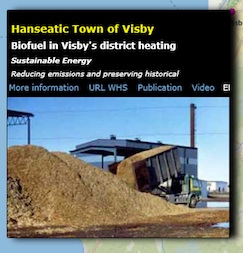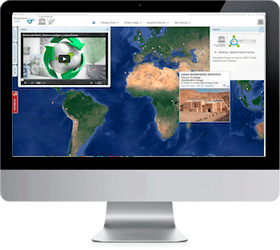Reducing emissions and preserving historical buildings at the world heritage site.
 Visby is a world heritage town. Gotland limestone features prominently in its buildings and ruins. Some of its oldest buildings also have beautifully carved portals and friezes in Gotland sandstone. Both these stones are sensitive to airborne contaminants and, in particular, emissions from the burning of fossil fuels.
Visby is a world heritage town. Gotland limestone features prominently in its buildings and ruins. Some of its oldest buildings also have beautifully carved portals and friezes in Gotland sandstone. Both these stones are sensitive to airborne contaminants and, in particular, emissions from the burning of fossil fuels.
As an element in the preservation of Visby’s buildings, construction of a district heating network began some 30 years ago. Now, all heat in Visby’s district heating system is produced using a mix of renewable energies. Heating of the municipality’s properties is mainly provided by the district network, connection to this being part of the municipality’s push towards Gotland having a sustainable energy supply.
In Visby as a whole, district heating accounts for over 80 percent of all heating supplied to commercial premises and dwellings. To the benefit of Visby’s residents and the town’s heritage, this heating contributes to a sustainable society.
Environmental benefits
District heating removes the need for fuel transport in the narrow streets of Visby’s town centre. The use of biofuels reduces the emission of sulphur and nitrogen oxides. Compared to the use of fossil fuels, it also lowers the net addition of carbon dioxide to the atmosphere.
Fossil fuels have not been used in Visby’s district heating since 2006.
Since 1980, sulphur emissions from Visby’s district heating have fallen by 95 percent.
In comparison with individual heating, district heating leaves the air cleaner and healthier for Visby’s residents and the town’s sensitive cultural heritage.
The district heating network in Visby takes its heat from
- Bark, twigs, branches and other (chipped) residues from forest clearances and sawmills.
- A sea water based heat pump with an 11 MW capacity.
- Biogas from the now closed landfill site in Visby.
- Biogas from the wastewater treatment plant.
- Bio-oils that replace fossil oils.
RE related initiatives on Gotland:
Pioneering Smart Grids on Gotland















